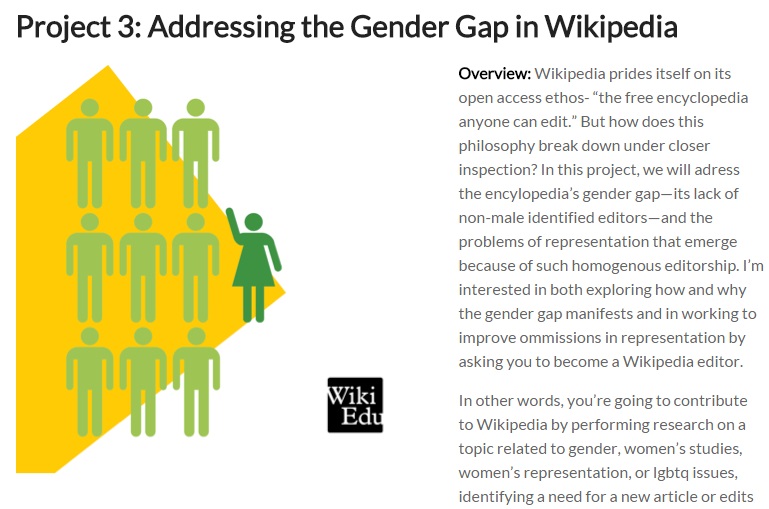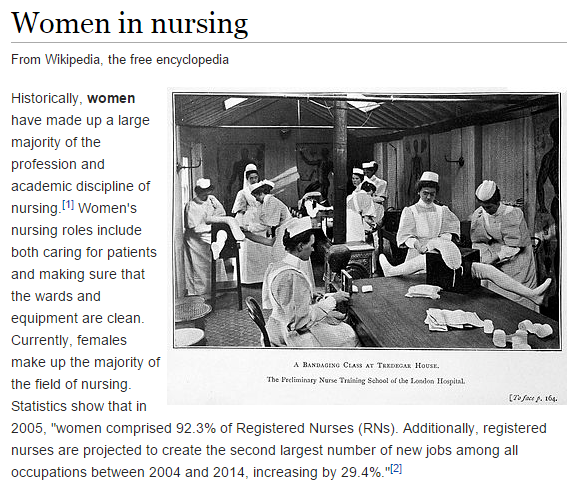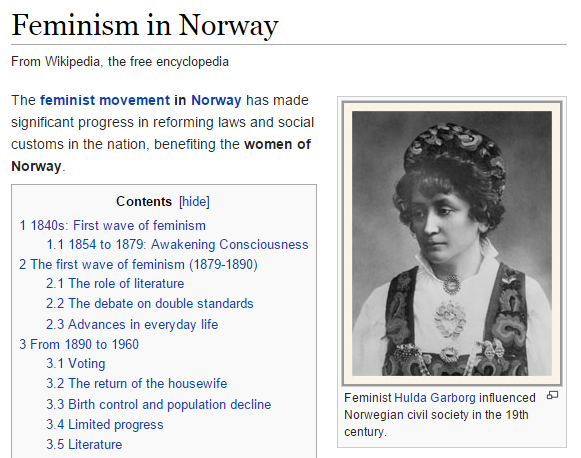 Welcome back to Wiki Wednesday! As part of the Digital Rhetoric Collaborative’s current focus on activism in online spaces, we’re dedicating a series of Wiki Wednesday posts to interrogating Wikipedia as a site for making, sharing, and circulating meaning. We’ve already shared a few posts that work toward this focus. Heather Lang’s reflection on some of the obstacles she faced as a female graduate student trying to adapt to the culture of Wikipedia kicked off our series. I followed up a few weeks ago with a post about how Wikipedia’s adherence to print culture limits the types of knowledge it can represent. More recently, we invited Eryk Salvaggio, Communications Associate for the Wiki Education Foundation, to share some information about all of the support the Foundation offers for instructors interested in getting their students involved in Wikipedia writing projects. His post also included some rich discussion of the potential of the Wikipedia Education Program to help make the encyclopedia a more diverse and inclusive environment, focusing especially on the gender gap. Because a large majority of Wikipedia editors are male, Wikipedia’s coverage often omits the representation of articles on topics about or of interest to women. In the most recent post in this series, I discussed a Wikipedia writing project designed to remediate the encyclopedia’s gender gap, to expand its coverage and representation of articles of interest to and about women and lgbtq identities. A few weeks ago, that project – which I collaborated on with the amazing Sarah Einstein – was just getting underway. This week, I’m coming back to it to:
Welcome back to Wiki Wednesday! As part of the Digital Rhetoric Collaborative’s current focus on activism in online spaces, we’re dedicating a series of Wiki Wednesday posts to interrogating Wikipedia as a site for making, sharing, and circulating meaning. We’ve already shared a few posts that work toward this focus. Heather Lang’s reflection on some of the obstacles she faced as a female graduate student trying to adapt to the culture of Wikipedia kicked off our series. I followed up a few weeks ago with a post about how Wikipedia’s adherence to print culture limits the types of knowledge it can represent. More recently, we invited Eryk Salvaggio, Communications Associate for the Wiki Education Foundation, to share some information about all of the support the Foundation offers for instructors interested in getting their students involved in Wikipedia writing projects. His post also included some rich discussion of the potential of the Wikipedia Education Program to help make the encyclopedia a more diverse and inclusive environment, focusing especially on the gender gap. Because a large majority of Wikipedia editors are male, Wikipedia’s coverage often omits the representation of articles on topics about or of interest to women. In the most recent post in this series, I discussed a Wikipedia writing project designed to remediate the encyclopedia’s gender gap, to expand its coverage and representation of articles of interest to and about women and lgbtq identities. A few weeks ago, that project – which I collaborated on with the amazing Sarah Einstein – was just getting underway. This week, I’m coming back to it to:
- highlight the work students were able to accomplish in Wikipedia,
- discuss the major challenges of the project, especially concerning how some students and their edits were met with distrust and immediate censure by other Wikipedia editors, and finally,
- acknowledge the risks associated with this type of critical digital praxis.
What We Accomplished
Because this project engaged students across three sections of the same class – a junior composition course focused on gender and writing – we were able to engage multiple articles across topics dealing with women’s and lgbtq issues and representation. Accordingly, students worked on and created articles dealing with a variety of subjects, from yoga pants, biographical articles on under-represented women, women’s sports teams, to Feminism in Norway, Women in Nursing, Kate Bornstein, Belle Knox and multiple others.
sections of the same class – a junior composition course focused on gender and writing – we were able to engage multiple articles across topics dealing with women’s and lgbtq issues and representation. Accordingly, students worked on and created articles dealing with a variety of subjects, from yoga pants, biographical articles on under-represented women, women’s sports teams, to Feminism in Norway, Women in Nursing, Kate Bornstein, Belle Knox and multiple others.
In total, 55 students edited 57 existing articles and created 14 new ones.
At this point, it’s difficult to assess their lasting impact. Students in one section are still finishing up. Some students’ edits, as discussed below, were edited down or reverted by other Wikipedians. However, I do believe it’s safe to say we made a sizable impact on the representation of women and lgbtq issues and identities, despite how far we still have to go with this type of work. 
For full access to student-edited articles, see course page dashboards for each section, which also details other statistics, such as total edits, characters added and article views:
- Women and Writing Section 1 Dashboard
- Women and Writing Section 2 Dashboard
- Women and Writing Section 3 Dashboard
What’s a Deletionist? Anti-LGBTQ Sentiments in Wikipedia
Although many students experienced very little or no resistance to their edits, those who did (either through another editor reverting their revisions or tagging their newly created articles as candidates for “speedy deletion”) were usually adding LGBTQ content. One of the most disturbing instances of student/LGBTQ censure was the immediate tagging of the Black AIDS Institute article with a “speedy deletion” recommendation. This recommendation, which can be accessed and viewed in an older version of the article, was applied 12 seconds after a student had created the article and a lead section (intro) as a placeholder from which to make more edits. 12 seconds.
Rather than providing a rationale for deletion, the result of such tagging places the impetus on the creator of the article to prove the value and/or notability of the article through a “contest this speedy deletion” process. For a novice editor, someone participating in the Wiki Education Program for the first time, such a process would be, of course, complete foreign and intimidating. The fact that this student was creating the article with the intent to provide more content through additional edits is additionally troubling. The editor responsible for the tag, user:Finngall, apparently could not wait longer than 12 seconds to nominate it for deletion. Look more deeply into his contributions, and we find out that this particular editor specializes in this kind of work; he spends a lot of time specifically looking for new articles that might qualify for removal. Finngall is a deletionist.
But if a project like the Wikipedia Education Program is to work, and if it is to enable the remediation of the encyclopedia’s gender gap and create a more inclusive encyclopedia, we must re-think and challenge such deletionism . We cannot afford to invite novice student-editors into the community and reward them for their efforts with what amounts to hasty and inconsiderate erasure of both their identities as contributors and the already marginalized content of their contributions. With help from instructors, this student was able to contest the deletion, and to finish the article contribution, but we must wonder how likely it is that this student will want to make additional contributions after this negative first experience.
Critical Digital Praxis: A Risky Endeavor
In part 1 of this feature, I wrote about how this kind of pedagogical model, which engages students in meaningful public writing, might be better understood as a type of critical digital praxis,
“a model for making writing interventions in public digital cultures in order to both better understand the writing activities of those cultures and make meaningful impressions with/in them. I invoke praxis in the tradition of Paulo Freire and Hannah Arendt, to indicate a socially meaningful and rhetorically conscious method of active response to and within actual social cultures, one that bases such action on careful reflection of the ways in which writing mediates social realities and hierarchies. Praxis is the understanding and enacted practice of writing to effect social action, to establish relationships, to construct our selves and others in the world. It is what makes us human, and what makes us capable of making responsible, critical and reflective meaning in our daily lives. In coming to a new understanding of the cultural politics of representation in Wikipedia, students engage in critical digital praxis to become more capable citizens of our digital world.”
Now, on the other side of the project, I continue to believe that assignments like this one can embody such an optimistic articulation of the potential for writing pedagogy. Furthermore, I believe projects like these can change students and can help them change public culture – that they can make students acknowledge their own capability for cultural participation. Yet I am also worried about the risks associated with students working in (digital) public spaces. How can we create collaborative projects that mitigate students’ risk of censure or marginalization but which still accomplish public work? Do the risks outweigh the more positive outcomes? How do we balance the motivation to allow student to accomplish public praxis while still protecting them as novice writers?


